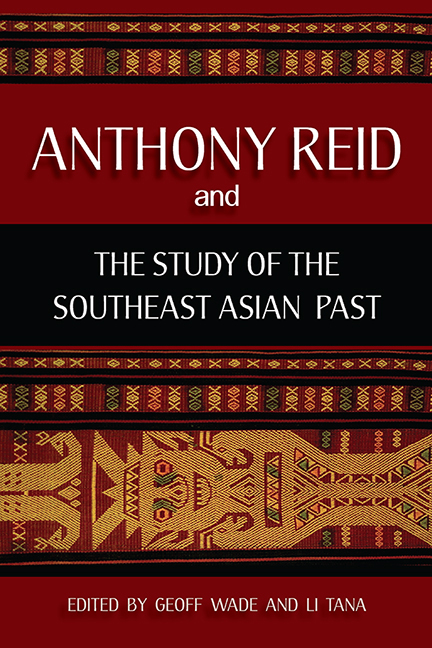Book contents
- Frontmatter
- Contents
- Acknowledgements
- The Contributors
- PART I Introduction
- PART II The Scholarship of Anthony Reid
- PART III Southeast Asia in the World
- PART IV Early Modern Southeast Asia
- PART V Modern Southeast Asia
- 13 Hadhrami Projections of Southeast Asian Identity
- 14 Absent at the Creation: Islamism's Belated, Troubled Engagement with Early Indonesian Nationalism
- 15 Chinese Shrines Contested: Power and Politics in Chinese Communities in Bangkok in the Early Twentieth Century
- Appendix
- Index
- Plate section
14 - Absent at the Creation: Islamism's Belated, Troubled Engagement with Early Indonesian Nationalism
from PART V - Modern Southeast Asia
Published online by Cambridge University Press: 21 October 2015
- Frontmatter
- Contents
- Acknowledgements
- The Contributors
- PART I Introduction
- PART II The Scholarship of Anthony Reid
- PART III Southeast Asia in the World
- PART IV Early Modern Southeast Asia
- PART V Modern Southeast Asia
- 13 Hadhrami Projections of Southeast Asian Identity
- 14 Absent at the Creation: Islamism's Belated, Troubled Engagement with Early Indonesian Nationalism
- 15 Chinese Shrines Contested: Power and Politics in Chinese Communities in Bangkok in the Early Twentieth Century
- Appendix
- Index
- Plate section
Summary
When reflecting on the career of a historian with a published repertoire as sweeping, diverse, deep, and influential as that of Anthony Reid, one marvels, at one level, at a lone scholar's capacity to confront, explicate and interpret with such sureness and imaginativeness so many different sets of circumstances, contexts, and periods of time. At a deeper level still, one is set to thinking of questions of historical technique and historical explanation, and in particular of the interplay of diverse individuals and larger forces and ideas and how they engage and collide in making history. Reid's own rich corpus gives of many such examples of the interchange between broad shaping forces of the Braudellian kind (“all the major forms of collective life, economies, institutions, social structures in short and above all, civilizations”) and the historical specificity of an individual's or group's conscious and unconscious behaviour. In seeking to pay Reid tribute, I was drawn, as he himself has often been, to looking at an old, perhaps ignored problem, inspired both by the new agendas for understanding the past which the contemporary always throws at the historian, and by Reid's easy mastery of the interplay of the individual and larger social forces through time. The problem I have chosen is a simple one: why did Indonesian Islamism (by which I mean that understanding which demands that the exercise of politics be grounded upon Islam above all else) fail to have a significant, consequential impact on the course of Indonesia's twentieth century history? In beginning to address it — that is all space allows me here — I will restrict myself purely to an analysis of Islamism's engagement with the discourses and directions of early Indonesian nationalism.
Islam and the Na tionalist Na rrative
The received orthodoxy of Indonesia's coming to be as a modern nationstate is, we all know, a determinedly secular one; the narrative traces the emergence and struggles of a modernizing young elite increasingly captured with and entranced by Westernized visions of nation, progress and prosperity. After some encouraging but ultimately false starts grounded successively in ethnicity, religion and international communism, the nationalist narrative takes flight with the inclusivist affirmation of the nation-ness of the whole archipelago which, the narrative goes, reaches its natural and necessary goal in Sukarno's proclamation of the independence of the Republic of Indonesia in August 1945.
- Type
- Chapter
- Information
- Anthony Reid and the Study of the Southeast Asian Past , pp. 303 - 335Publisher: ISEAS–Yusof Ishak InstitutePrint publication year: 2012

